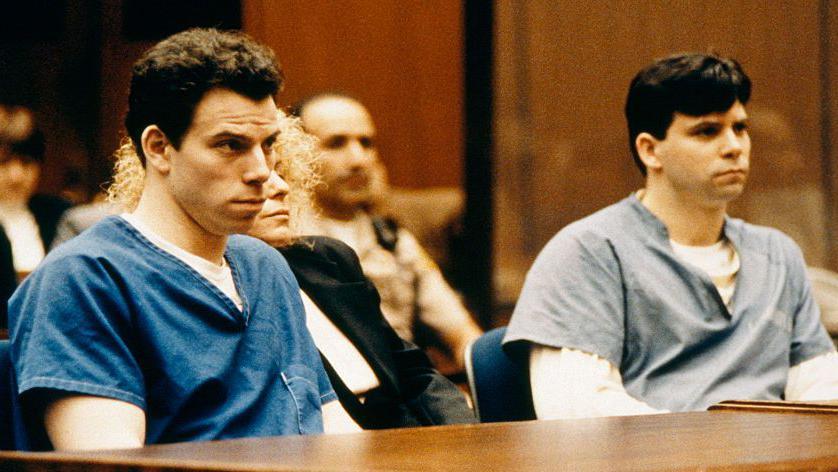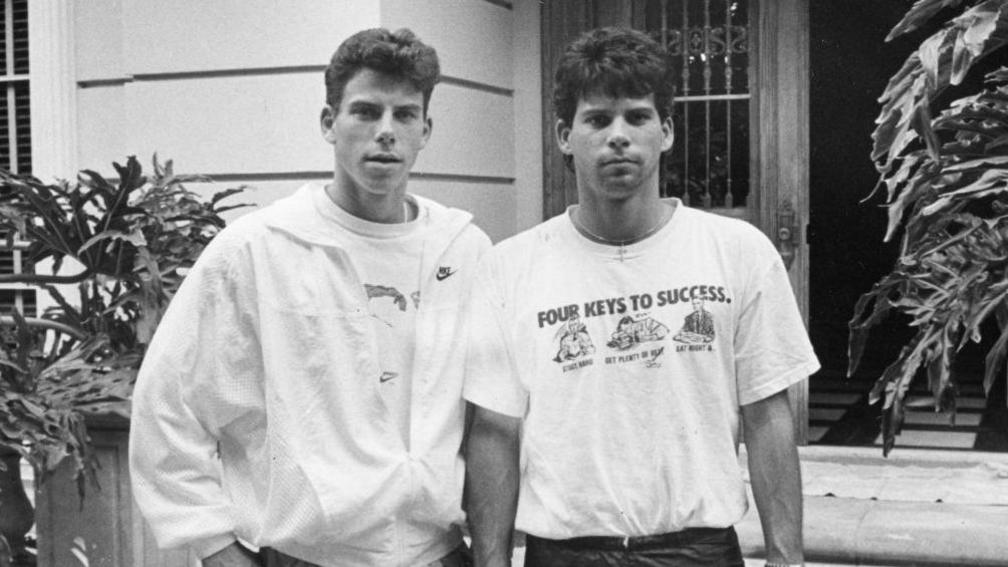What to know about the Menendez brothers resentencing hearing

- Published
After decades in prison, Erik and Lyle Menendez have a chance at being resentenced - and possibly freed - in a murder case that still divides America.
The pair, who are serving life in prison for the murder of their parents, appeared in a Los Angeles court via video stream on Thursday as a judge readied to hear arguments whether they should or should not be resentenced at a long-anticipated hearing.
The pair are serving life in prison for killing their parents, Kitty and Jose Menendez, in 1989, when they were 21 and 18. Their case gained renewed attention after a popular Netflix series last year.
After a contentious start to the proceedings on Thursday, the judge ultimately decided to postpone the resentencing hearing until next month.
The hearing will determine whether the pair should be resentenced to a lesser penalty. If approved, the brothers could become eligible for parole - potentially allowing their freedom.
Prosecutors have argued Erik and Lyle meticulously planned the killings so they could access their parents' fortune. The current Los Angeles District Attorney says the brothers have continued to cling to lies about the case and should not be freed.
But the brothers' lawyers have long argued the killings were an act of self-defence and claimed their father abused them for years. They have also pointed to court filings detailing their rehabilitation during their years behind bars.
Here is how Thursday's hearing unravelled, what comes next - and a recap of how we got here.
What did the Menendez brothers do?
The brothers shot and killed their parents with shotguns at their Beverly Hills mansion, but there has long been a debate over their motive.
Prosecutors painted them during their trials as spoiled rich kids who wanted to access their parents' $14m (£10.7m) fortune. They argued that the duo methodically planned the killings, buying shotguns and opening fire on their parents 13 times as the couple watched TV - before going gambling, to parties and on shopping sprees.
The brothers ultimately admitted to the killings - but argued they acted out of self-defence after years of emotional, physical and sexual abuse by their father Jose, a high-powered film and record label executive.
The brothers' trial in 1993 was one of the first high-profile murder cases to be shown live on television, gripping audiences in the US and globally.
It ended deadlocked, but in 1996, the brothers were convicted of first-degree murder in a second trial during which the judge barred many of their claims of sexual abuse. They are imprisoned near San Diego.
What led to resentencing hearing being postponed?
The hearing on Thursday got a contentious start - and ultimately led to the judge postponing the proceedings until next month.
The day started with the Los Angeles County District Attorney's Office making a last-minute request to postpone the hearing so the court could examine a new report done by the state's parole board.
The report, a risk assessment, examined whether the brothers pose a risk to the general public if they were to be released on parole. It was done at the request of Gov Gavin Newsom after the brothers asked him for clemency in their case, another avenue Erik and Lyle have been chasing in hopes of being freed from prison.
The hearing went forward and attorneys representing the Menendez brothers and the victims' families launched a multi-pronged attack against the Los Angeles County District Attorney's Office, which is opposing the resentencing effort.
They accused prosecutors of violating victims' rights by displaying graphic crime scene images and creating a conflict of interest on the parole board.
Mark Geragos, a high-profile defence attorney representing the brothers, said he would ask for the district attorney's office to be recused.
Los Angeles County Superior Court Judge Michael Jesic defended the prosecutor leading the case, Habib Balian, and the prosecutor apologised for not giving the family a notice about the gruesome photos before they were shown.
The judge told attorney Bryan Freedman, who is representing members of the Menendez family vying for their release, that things will come up in these hearings that will be tough for family to see and hear.
"If anyone is uncomfortable, they need to think about whether they should be here," the judge warned.
Then after a lunch break, the judge decided he would postpone the proceedings until 9 May so he has time to mull the risk assessment report and the request for the district attorney's office to recuse.
What happens next?
If the hearing goes as planned on 9 May, the judge will look at evidence, hear from witnesses, and ultimately determine whether Erik and Lyle should be resentenced.
It will not be a re-trial, and guilt will not be a question. Much of the focus is likely to instead be on what the brothers have done during their 30 years in prison.
The hearing is not being televised.
Both sides - lawyers for the Menendez brothers and the district attorney's office - will be able to call people to testify.
This could include a wide variety of individuals, from people involved in prosecuting the brothers in the 1990s or prison officials talking about the brothers' last 30 years behind bars.
We are likely to hear from members of the Menendez family, many of whom have become outspoken advocates for Erik and Lyle's release. But at least one member of the family has been a fierce critic of the effort to free them.
Milton Anderson, who is Kitty Menendez's brother, has called the brothers "cold-blooded" and has argued the pair should remain behind bars for the "heinous act".
Will Erik and Lyle Menendez testify?
The brothers appeared in court on Thursday via a video feed from prison, wearing cobalt blue prison uniforms and matching stern expressions as prosecutors and attorneys haggled over their fate.
It is unclear whether they will address the court as part of their resentencing bid.
If they did, it would mark a significant moment in the case, and would leave them open to questions from prosecutors who oppose their release.
The pair have previously only appeared in court remotely by video link. The BBC has asked whether they will testify.
On a recent episode of his podcast, their lawyer Mark Geragos said he had not decided whether to call them to the stand.
"I know right now that I'm going to put family members on the stand," Mr Geragos said. "I know right now, I'll put correctional officers on the stand. I know right now I may put behavioural scientists on the stand."
The district attorney's office has similarly not said who it plans to call to testify.

Erik and Lyle Menendez were 18 and 21 when they killed their parents with shotguns in 1989
When will a judge rule, and what will it mean?
After the hearing happens and concludes, Judge Jesic will rule on whether the brothers should be resentenced.
But it is not clear when that will happen, though.
The judge addressed his timing on a decision at Thursday's hearing.
"There's no way I'm going to make a decision in the next two days to resentence," he told both sides.
Could the Menendez brothers go free after the hearing?
Even if Judge Jesic rules in favour of the brothers being resentenced, they will not be immediately released.
What happens next will depend on what type of sentence the judge offers the brothers. There is a chance they could be given a new, lesser sentence that would make them immediately eligible for parole.
But eligibility does not guarantee release; they would still need to convince a state parole board they are no longer a danger to society.
Or the judge could opt for a modified sentence that reduces their punishment but does not immediately open the door to parole. In that case, the brothers could face several more years behind bars before becoming eligible.
Why is this happening now?
The Menendez brothers filed a motion in 2023 detailing new evidence alleging childhood sexual abuse by their father, and requesting their convictions be vacated.
The evidence included an allegation of rape from a former member of boy band Menudo, Roy Rosselló, and a letter Erik Menendez wrote to a cousin eight months before the murders, which detailed the alleged abuse.
The top LA prosecutor at the time, George Gascón, announced that he was supporting the resentencing bid, days before an election in November 2024. He denied the announcement was political and argued it was a long time coming.
Gascón's announcement came shortly after a popular Netflix documentary and TV drama welcomed a new generation to the case. Many of the brothers' supporters suggest that if they were put on trial today, their allegations of abuse would be taken more seriously – potentially leading to a very different outcome.
After Gascón lost his re-election bid, Nathan Hochman took over the his office and the Menendez case. Hochman came out forcefully against their resentencing request, and said the brothers continued to stick by a litany of "lies".
"They have not shown full insight into their crimes," he said. But Hochman was rebuked by a judge who allowed the resentencing request to move forward.
Resentencing is just one route to possible freedom
The brothers have been following three paths in an effort to win their freedom. The other two are:
Clemency from the governor of California: This could mean a reduced sentence or even a pardon, but would not overturn the brothers' convictions. Governor Gavin Newsom has ordered the parole board to conduct a risk assessment to determine if they pose a danger to society. A hearing is scheduled in June to discuss findings
A new trial: The brothers' lawyers have also asked for a new trial, pointing to the alleged abuse by their father and arguing that jurors should be able to consider a lesser sentence, such as manslaughter. Hochman opposes this